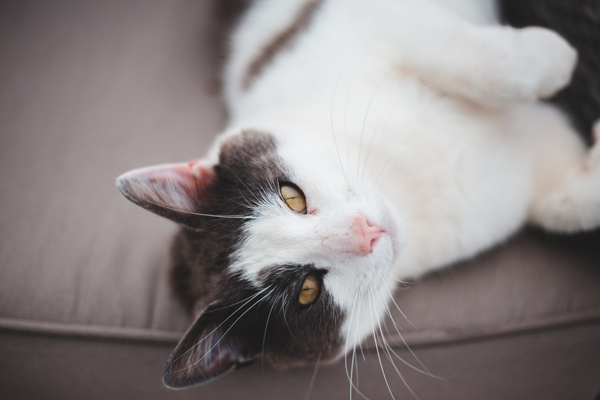
Growing older…. It’s the one constant in life that affects all of us – even our beloved pet pals. While pups and kittens will be bounding around the yard playing catch, our canine and feline friends may be slower to get to the ball.
While it depends on breed and size, generally dogs are considered ‘seniors’ at seven years old and cats today are ‘senior’ from approximately 11 years. Signs of ageing include general slowing down in their activity, more interest in sleeping, a cloudy tinge in their eyes or loss of muscle and weight gain.
As our pets age, their physical and mental well-being needs greater attention, and any noticeable changes in their behaviour should be reviewed by a vet. Our pets may be more prone to health issues as they age, such as arthritis and dental disease, but it’s also their emotional and mental well-being that needs extra care as they age.
Whether you’re a pet parent or filling in for one on a pet sit, it’s important to be aware of a pet’s life stage and their specific needs to live their best life.
Diet
Throughout their lives, our pet pals should have access to a well-balanced, nutritious diet. Gradually switching to a seniors diet may help your pet’s digestion, provide extra minerals for heart and kidney health and a boost to their protein intake. Provide pets with a high-quality diet and ensure it meets the Australian Standard for Manufacturing and Marketing of Pet Food, and always seek advice from a vet before changing your pet’s diet.
Mobility
It’s likely that an animal’s movement and energy levels will decrease as they get older. There are health conditions that will limit your pet’s mobility, so it’s best to get these identified and treated as soon as they become evident. For instance, if left untreated arthritis can be painful for animals and impact their overall well-being and happiness. If your pet has difficulty getting up after a rest or shows reluctance to jump up onto furniture, this could be a sign of arthritis. Get this checked out with a vet and continue to monitor your pet’s progress.
Exercise
While they may not seem as interested in exercising when they’re older, you need to continue regular exercise with senior pets to support their mobility. Adjust routines to suit your pet’s ability – exercises may be gentler, walks may be shorter and consider exercise such as swimming, which is easier on their joints.
Dental Care
Dental hygiene for pets is often overlooked, with dental disease affecting 80% of dogs by the age of three.[1] Dental disease can cause infections in the teeth and gums and can lead to more serious health issues with the kidney, liver or heart. Get your pet used to regular teeth brushing from a young age to avoid painful dental disease later in life.
Sensory Considerations
As our pets age their sight, hearing and taste may be affected. If your pet has low vision, gently announce yourself when you approach them. If they have hearing loss, help them become familiar with hand signals or other cues to help them understand.
Mental Enrichment
Pets need mental stimulation throughout every stage of life, and it is just as important when they’re older. Continue to include your pet in family activities and outings, provide scent or food puzzles aligned with their ability and spend quality time with your four-legged friend to reduce cognitive decline in their later years.
Always consult a vet if you are concerned about your pet’s physical or mental well-being to get professional advice about treatments and strategies for senior animal care.
For more detailed advice about caring for older dogs, download the RSPCA Pet Insurance’s Old Pet Care eBook or see Templestowe Veterinary Clinic’s website.
[1] https://www.rspcapetinsurance.org.au/getattachment/pet-care/health/Older-pet-care-Guide-to-caring-for-older-dogs-(eB/article-documents-geriatric-pet-care-guide-ebook.pdf.aspx